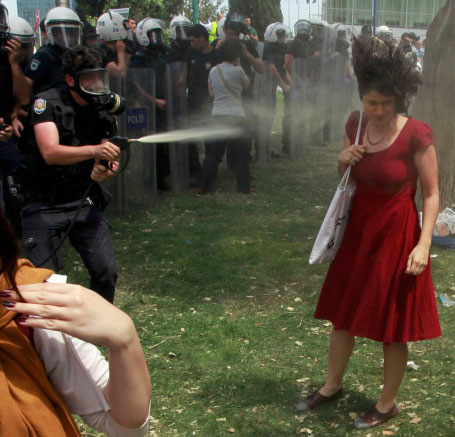
May 23, 2016, by Harry Cocks
Turkey: A State of Exception?
In 2013 peaceful protests against the development of Gezi park, one of the few remaining public green spaces in Istanbul, were brutally dispersed by police and security forces, generating worldwide headlines. The actions of the police were sanctioned by laws dating to the state of emergency established following the military coup of September 1980 and which lasted formally until November 2002. This “state of exception” to the normal operation of law, which extended police powers, and suspended human rights in areas where the emergency applied, was mainly used to by agencies of the Turkish state in combating the campaigns of the Kurdish Workers’ Party (PKK) for an independent Kurdish state, an insurgency that has rumbled on mainly in South Eastern Turkey and Iraq since 1984. In a new article (see link below), Egemen Bezci a Ph.D candidate in Nottingham’s History Department, along with co-author Güven Gürkan Oztan of the University of Istanbul, argues that because of the longstanding nature of emergency rule in Turkey the line dividing what the Italian political theorist Giorgio Agamben calls the “state of exception” and the normal rule of law has become blurred. Bezci also argues that the emergency provided the instrument which enabled the Turkish General Staff to intervene in civilian politics, a mechanism that is still used to assert raison d’etat above all other political priorities. In that sense the emergency was, above all else, the expression of Turkey’s raison d’etat, defined as the sum of strategies, rules and norms by which the state administers its authority and aims to preserve itself against external and internal threats.
The constitution established following the 1980 coup was ratified by referendum in 1982, a result which confirmed the coup’s leader Kenan Evren as Turkey’s 7th president and formalised the state of emergency as part of Turkey’s legal and political systems. After the coup its leaders established mechanisms to shape the new political landscape, the key one being the National Security Board (Milli Guvenlik Konseyi, or MGK) made up of generals from all the services. Its members were subsequently appointed to the National Security Council established by Evren in 1982. The MGK created the machinery that enabled the military to interfere in civilian politics without the necessity of direct rule. The general staff was able to define the state of emergency as the times and territories in which they could intervene to solve existing or emergent crises, such as when the civil police and gendarmerie came under threat from terrorism, civil wars or external threats. A crisis of this nature soon arose in form of the PKK insurgency. This allowed the armed forces to intervene in civilian politics to, in their view, restore and protect state authority. The new civilian administration, elected in November 1983 formed a de facto coalition with the MGK in order to combat PKK claims to embody a legitimate state.
By 1990 the emergency included 13 cities and was extended even by its opponents, including the leader of the Islamist-origin Welfare Party, Necmeddin Erbakan, who became prime minister in 1996. In that sense the emergency had become part of the Turkish state – it was increasingly difficult to separate the “state of exception” from the regular operations of the state. The Turkish emergency therefore is a case study of how such “states of exception,” like similar ones that continue to exist in US and Europe ostensibly to combat terrorism, can be incorporated into the normal operation of the modern state.
Egemen Bezci and Güven Gürkan Oztan, “Anatomy of the Turkish Emergency State: A Continuous Reflection of Turkish Raison d’Etat Between 1980 and 2002”, Middle East Critique (February 2016) http://dx.doi.org/10.1080/19436149.2016.1148858

bts